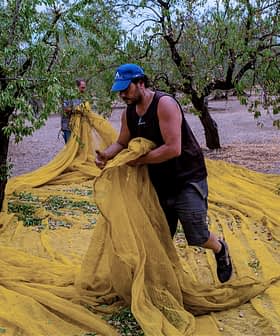Research Confirms Xf to Blame for Desiccation of Salento Trees
A project funded by the European Food Safety Authority EFSA confirmed that the destruction was caused by the Xylella fastidiosa bacterium.
 Field trials have shown that the infective spittlebug (Philaenus spumarius), widespread in Apulia, can transmit the bacteria to olive trees.
Field trials have shown that the infective spittlebug (Philaenus spumarius), widespread in Apulia, can transmit the bacteria to olive trees.The plant epidemic that is causing the so-called CoDiRO or Rapid Complex Desiccation of Olive Trees in Salento (Apulia) was, without doubt, caused by the Xylella fastidiosa bacterium. This is the conclusion, reached by the European Food Safety Authority (EFSA), on the basis of research conducted on its behalf by the National Research Centre (CNR) and by the Basile Caramia Research Center in Locorotondo (Bari).
Researchers exposed varieties of major perennial crops to the bacterium through artificial inoculation and by exposure to infective insect vectors in the field. Not only olive trees were tested but also other Mediterranean plants such as grape, citrus, almond, peach, cherry and plum, forest species such as holm oak and ornamental species such as oleander and myrtle-leaf milkwort.
See Also:Complete Coverage of the Xylella Fastidiosa Outbreak
“These findings confirm that the CoDiRO strain of Xylella fastidiosa causes olive dieback,” said the head of EFSA’s Animal and Plant Health Unit, Giuseppe Stancanelli. “This is an important step forward because we can only accurately assess the risk of an epidemic spreading from Apulia if we fill knowledge gaps on the host range and epidemiology of the Apulian strain.”
According to EFSA, the olive trees inoculated with Xylella fastidiosa by researchers presented the same severe symptoms as those in Salento, with desiccation and death, but it was found that not all varieties react the same way. The bacterium seems to take longer to colonize the variety of Coratina, Leccino and Frantoio than the Cellina di Nardò, who is one of the most common varieties in the contaminated area. However, according to the researchers, more tests on a larger number of olive cultivars are necessary to understand the different physiological responses to the aggression of the bacterium.
The field trials have also shown that the infective spittlebug (Philaenus spumarius), widespread in Apulia, can transmit the bacteria to olive trees, oleander and myrtle. While none of the citrus, screw or holm plants tested positive for Xylella fastidiosa upon exposure to infective P. spumarius or direct inoculations. Further tests are necessary for stone fruits like peach and plum.
“The results of this study significantly reduces the uncertainties about the risks of Xylella in the European Union. As part of the EU research funding program Horizon 2020, there will be specific programs for the control of this disease,” Stancanelli concluded. All the inoculated plants will be kept under observation for at least one more vegetative season, while field experiments will be extended for up to 10 years.
Nevertheless, the study is going to raise doubts and protest, first of all for the potential conflict of interest concerning some of the researchers involved: Vito Savino, Donato Boscia and Maria Saponari are three of the ten people named in the investigation started in December by the Prosecutor of Lecce, Cataldo Motta, for various infractions including spreading of a plant disease, willful violation of the provisions on the environment, fake material committed by public officials in public documents, fraudulent misrepresentation and the destruction or disfigurement of natural beauty.
Moreover, there are those who have expressed concerns since EFSA is not a body of the international scientific community but a government agency of the European Union that is appointed to assess the state of scientific research on the Xylella emergency, and is funding a study that will be included in its decisions.
“Our data are objective. And incontrovertible. Nothing changes,” Cataldo told the daily newspaper Nuovo Quotidiano di Puglia about the ongoing investigation: “We will acquire the EFSA study and submit it to our experts. It is necessary to have a complete scenery of the most accredited studies in order to realize a serious confrontation.”







